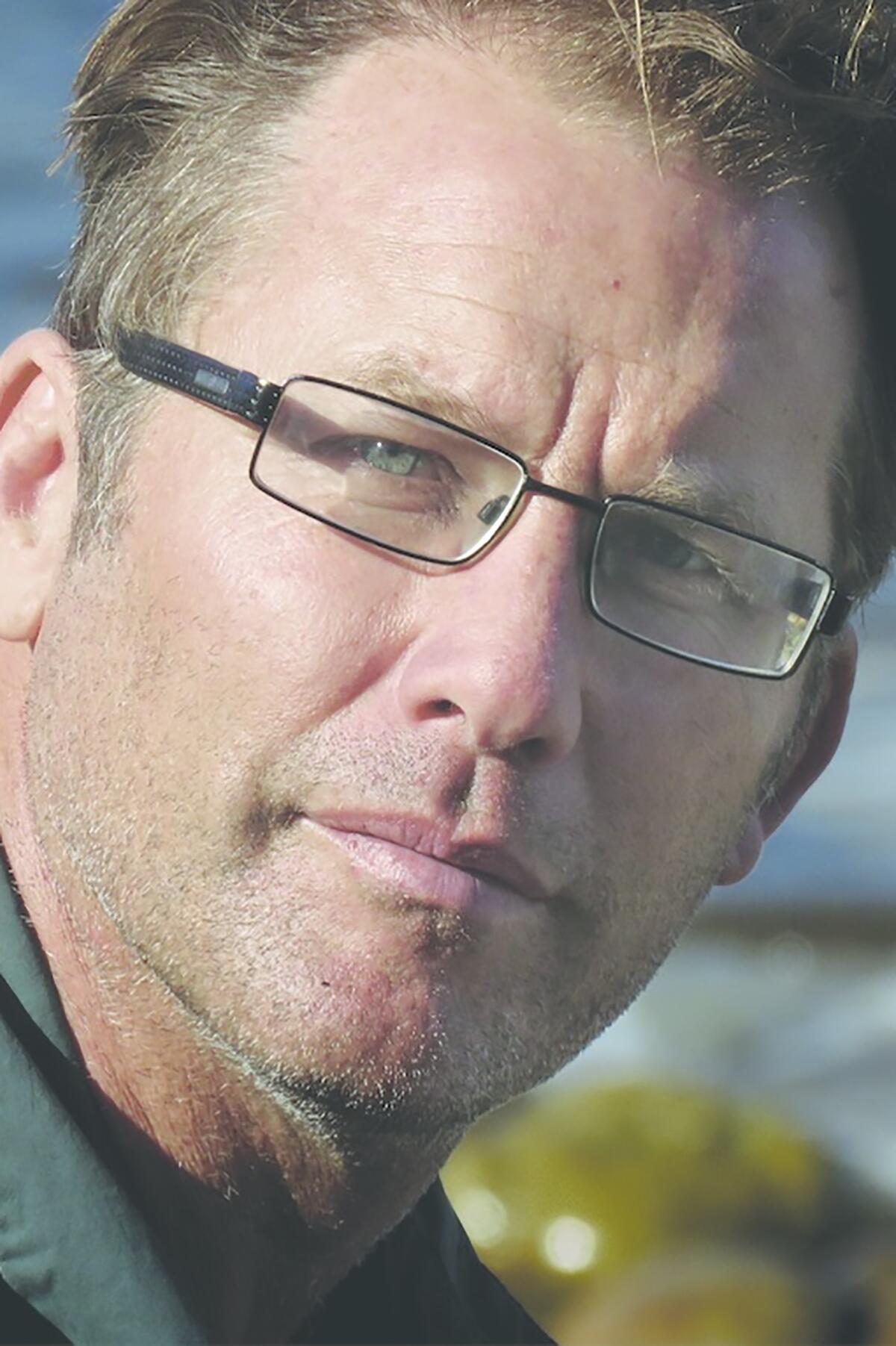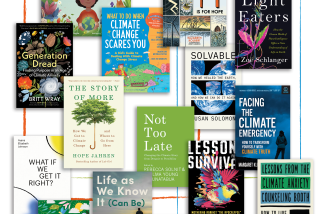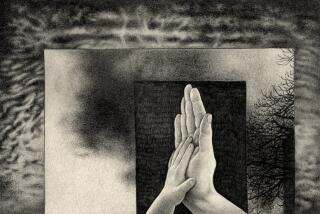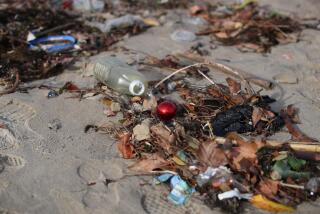‘My Octopus Teacher’ star takes a cold plunge to reconnect with nature in ‘Amphibious Soul’

- Share via
Book Review
Amphibious Soul: Finding the Wild in a Tame World
By Craig Foster
HarperOne: 320 pages, $30
If you buy books linked on our site, The Times may earn a commission from Bookshop.org, whose fees support independent bookstores.
When I started reading “Amphibious Soul: Finding the Wild in a Tame World,” a spiritual and urgent memoir by Craig Foster, I was working long days at the computer, only breaking to scarf down dinner, kiss my children on the forehead and give my husband an apologetic look.
For the record:
10:34 a.m. May 13, 2024A previous version of this article’s headline
misstated who directed the film “My Octopus Teacher.” The directors of the film are Pippa Ehrlich and James Reed.
Foster is known for his Oscar-winning documentary “My Octopus Teacher.” In his new book, his words cut through me as he describes his own days as a workaholic, too scared to turn down projects, prioritizing his films over his family: “My hands were soft, my heart was fragile, my smile was fading, and that wild creature was cowering deep inside, with hardly any light to guide its way out.”
Foster chronicles how he recrafted his life to let that wild creature out and reconnect with our “deep ancestors” who lived symbiotically with nature. He calls for all of us to reclaim our wild hearts.
“The rush of modern life, the continual need to do more and go further and move on to the next thing, had taken me, as it has taken so many of us, further and further away from myself,” he writes. “I knew if I continued in this way, I would be cheating myself out of something vital to being human: the wildness that is my inheritance, and yours.”
But if Foster could imagine what it was like for me, indeed many of us, to spend most of our waking hours staring at screens, it was difficult for me to imagine being in his seemingly fearless shoes.
The book begins with Foster and his film crew following the Nile crocodile, the largest freshwater predator in Africa, into an underwater cave (several years before “The Octopus Teacher”). The death-defying adventure unfolds like many nature documentaries that use suspense to keep viewers on the edge of their seats. In lieu of the visuals, Foster holds us with luscious prose.
“Below the swaying papyrus culms are networks of tight tunnels and dark caves, the underwater dens where the crocodiles drag their kills,” he writes.
Though this adrenaline-pumping episode brings him close to nature, Foster still feels apart from it. He realizes that reconnecting with his wild self requires more frequent encounters closer to where he grew up, along the Cape of Good Hope in South Africa. He begins a daily ritual of diving into the frigid, tumultuous ocean there, forgoing a wetsuit and scuba tank to reduce barriers as he reconnects with the waters of his childhood. Immersion becomes a path to healing for Foster, a way to invigorate the body in a world where we have created too much comfort.
“Whenever doubt crept in, I reminded myself that my deep ancestors got cold and wet every day,” he writes. “Depriving myself of this innate evolutionary experience was depriving myself of vitality and well-being.”
On his daily dives, Foster begins studying the Great African Seaforest and tracking creatures big and small, drawing inspiration from Indigenous hunter-gatherer communities, including the San people, whom he describes as so connected to nature that they can enter the minds of animals and track them without overt signs.
Foster connects deeply with the animals he encounters: A sea otter strokes his face as they gaze into each other’s eyes. Great white sharks allow him to dive with them. The book even gets spiritual as Foster explains how deeply we are connected to other beings. “I feel frog, I feel dragonfly, and if I stretch my mind, I even feel rock. I’m a frog-rock-spider-dragonfly. I’m a galaxy, and so are you.”
Foster insists that those of us who grew up in planned neighborhoods alongside strip malls, and for whom grass and manicured lawns were the earliest encounters with nature, also can find our way back to our wild selves. Mercifully, it does not require cold plunges to get there.
The book provides a practical guide on how to start tracking specimens in your own neighborhood, such as visiting the same place often and being still enough to let the wild world before you unfold.
Reading it encouraged me to get outside more often and to be more observant. One day, I found myself mesmerized as I locked eyes with a turtle, each of us taking in the marvel of the other’s existence.
Some of Foster’s story will be familiar to those who watched “My Octopus Teacher.” In the memoir, we learn that he struggled with the fame that came with the film’s success. Insomnia begins to undermine the progress he made. Slowly, the ocean and the creatures he befriended bring him back to equilibrium.
Foster notes that he is grateful for cameras and modern technology that let him connect with researchers around the world. To be both tame and wild is no easy feat, but I agree with him that developing a relationship with the natural surroundings wherever we live is important to feeling balanced.
The narrative bounces between vignettes about Foster’s life and his central point on wildness. At times this structure feels repetitive, as he returns to the same conclusions. Foster does so with the zeal of someone trying to convert his audience to an important discovery, and yet I can’t blame him for wanting us modern apes to wake up and step outside.
Unlike many books on climate change that discuss the ethical or moral obligation we have to protect habitats and animals, Foster’s explains that doing so is imperative if we wish to save ourselves. Indeed, this memoir could easily be filed in a bookstore’s self-help section.
What struck me most was Foster’s optimism that humans can find their way back to a symbiotic relationship with nature. As we cope with climate disaster after disaster without any sign that our relentless drive to produce more stuff will let up, I find it hard to imagine society switching gears.
But that kind of thinking assumes we are in charge. After witnessing how the Seaforest relentlessly pushes itself back to balance, how jellyfish patch up their own bite holes and octopi regrow shark-eaten arms, Foster is more clear-eyed about our placement in the grand scheme.
“If humans just went extinct, this whole planet would be revived,” he says bluntly. “Big Mother is running the show, not us.”
Ambreen Ali is a writer and journalist based in New Jersey.
More to Read
A cure for the common opinion
Get thought-provoking perspectives with our weekly newsletter.
You may occasionally receive promotional content from the Los Angeles Times.










